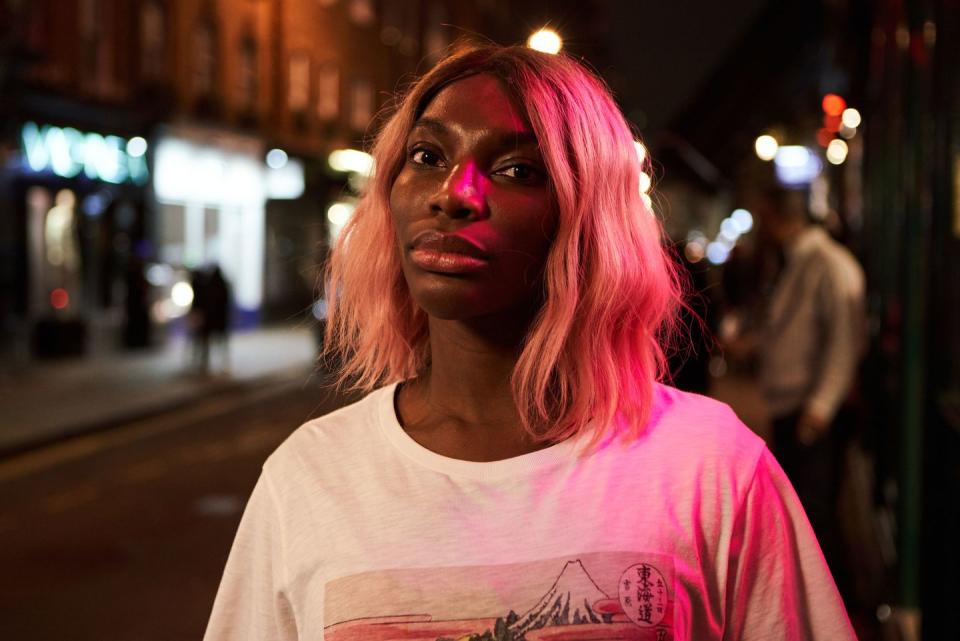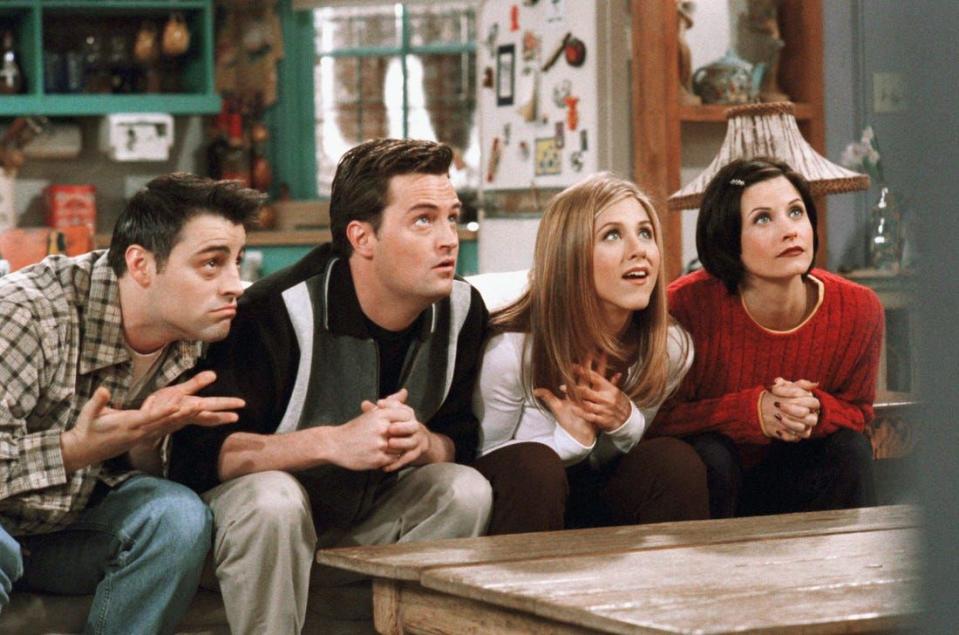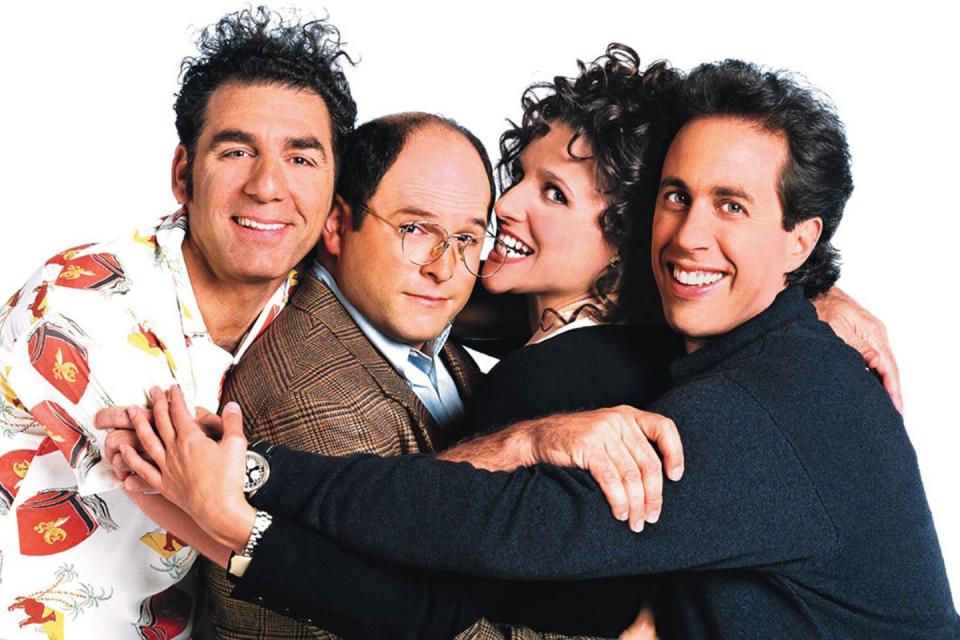The Age Of Comfort TV Is A Blessing And A Curse

I have measured my lockdown in reruns. Mad Men, Girls and The Sopranos each playing during a different stage of the fear, novelty and boredom that has spanned the last four months. My friends have gone in different directions with their pandemic viewing, some returning to nostalgic favourites and others binging on reality television, but what seems to be commonly agreed is that right now, television is your escape hatch from reality.
Somewhere between The Wire and Tiger King, between prestige TV and comfort TV, our expectations of what entertainment is meant to do for us changed. For years the distinction between cinema and television had been narrowing as the latter stopped being simply a vessel for beaming chuckling sitcoms at us at the end of a long day, and became more intense and thought-provoking.

The television of recent years has been electric, from the Shakespearian family feuds of Succession to the confronting of rape and trauma in tragicomedies like Fleabag and I May Destroy You. The format has come to life to respond to political instability and the indelible mark that living our lives online has left on us, as we all are waking up to the widespread racial and gender prejudices people have long lived with. Changes are finally being seen in the characters we see on screen and in the writers rooms that put them there, with series focusing on the experiences of women, Black people and other minorities to shine a light on underrepresented stories.
Yet at the same time there has been a deluge of comforting television which doesn't provoke but soothe us. These shows are a form of screen therapy after a day of screen trauma; a way of bubble-wrapping your brain from the onslaught of melting icecaps and crowds without masks on, which we scroll past images of all day.

In a Vulture article, Kathryn VanArendonk writes of how, in our current entertainment climate, "the idea that the categories of 'favourite' and 'best' can be collapsed into each other, carrying all of the favourite-implied ideas of pleasure, subjectivity, and enchantment into the definitions of greatness."
As with prestige TV, the quality isn't assured simply by the fact is is enjoyable, she says: "The difference now is that accessibility and cheerfulness do not instantly render a show less important. The desire for TV shows that foreground delight rather than despair is not a form of weakness. TV that makes us sad is not inherently better. The pandemic was the final death knell of 'prestige' as a meaningful indicator of anything at all."
Last year, speaking to people about the vogue for nostalgic reruns and remakes which have been strangling television and cinema of late, I was amazed at how many people were using television which reminded them of a simpler time to switch off from the present moment. In 2019 Friends was Netflix’s most streamed show in the UK for a second year running and the arrival of Seinfeld in 2021 will help fill the nostalgia void should it leave the streaming service for HBO Max, as has been rumoured.

Comfort TV is more than an old blanket we pull over ourselves, it's slowly becoming a genre which is churning out new content with increased regularity. Netflix bases it value of series and films on how likely you are to get to the end of them; for Original series this means emphasis is placed on creating something as binge-able as possible, which viewers will sink into for hours without coming up for breath.
In recent years this has spawned shows like the gentle late-life crisis Grace and Frankie, or the dark, but not too dark, comedy Dead to Me, as well as Ryan Murphy's saccharine drama The Politician and tween-bait like Hollywood and Never Have I Ever. It's not that any of these shows are bad, more that what's good about them is firmly rooted in how enjoyable and unchallenging they are. Even Stranger Things, the most watched Original series on the platform last year, evokes the gentle horror and suburban familiarity of an Eighties Spielberg film.

During this time Netflix has also hit the jackpot with weighty dramas like Ava DuVerney's Central Park Five dramatisation When They See us, or the dismantling of the perfect victim myth in the chilling true story Unbelievable. The streaming service has been at the forefront of the true crime boom with documentaries and series from Making a Murderer to Mindhunter. While documentaries like Don't F**k with Cats and Wild Wild Country are about exposing the strangest corners of humankind, the pandemic has seen a thirst for reality television which is devoid of any kind of reality.
When coronavirus started driving people inside back in March, the show everyone was streaming from their lockdown bunkers was Tiger King, a deranged but compulsive series about the eccentric and unhinged people who keep big cats as pets. The show appeals to our baser instincts, stuffing each of the episodes with the same shock twists about an attempted murder that had been teased from the first episode. Stranger than the series managing to stretch to eight instalments was the fact that everyone was still watching by the last one. Tiger King is not always comforting in its tone or content, often veering into distressing territory, but it adheres to the the comforting rhythm of reality television that we have all become accustomed to, one where each episode follows the the same steady beats of drama.

The same soothing cadence is on offer in Selling Sunset or one of the many series of Real Housewives that my friends are all plugged into, the petty dramas and aimless conversations offering an entertainment sinkhole where the stakes are low and walking down the street is accompanied by a jaunty soundtrack.
Though many of the best of comfort TV shows that television doesn't have to be disturbing to be valuable, the genre seems to serve as a direct antidote to the challenging television we are seeing flourish. It is the laughter track palate cleanser to the television which confronts the ugly bits of the world around us, but right now you could be forgiven for needing a good laugh.
Like this article? Sign up to our newsletter to get more articles like this delivered straight to your inbox
Need some positivity right now? Subscribe to Esquire now for a hit of style, fitness, culture and advice from the experts
You Might Also Like

 Yahoo Sports
Yahoo Sports 